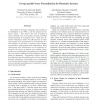Free Online Productivity Tools
i2Speak
i2Symbol
i2OCR
iTex2Img
iWeb2Print
iWeb2Shot
i2Type
iPdf2Split
iPdf2Merge
i2Bopomofo
i2Arabic
i2Style
i2Image
i2PDF
iLatex2Rtf
Sci2ools
PAMI
2010
2010
The Biometric Menagerie
The problem of biometric menagerie, first pointed out by Doddington et al. (1998), is one that plagues all biometric systems. They observe that only a handful of clients (enrolled users in the gallery) actually contribute disproportionately to recognition errors. While prior literature attempting to reduce this effect focuses on either client-specific score normalization or client-specific decision strategies, in this study, we explore a novel category of approaches: group-specific score normalization. While client-specific score normalization can be negatively impacted by the paucity of genuine score samples, groupspecific score normalization is less affected since the matching score samples of different clients belonging to the same group are aggregated. Experimental evidence based on face, fingerprint and iris modalities show that our proposal generally outperforms client-specific score normalization as well as the baseline systems (without any normalization) across all pos...
| Added | 29 Jan 2011 |
| Updated | 29 Jan 2011 |
| Type | Journal |
| Year | 2010 |
| Where | PAMI |
| Authors | Neil Yager, Ted Dunstone |
Comments (0)

